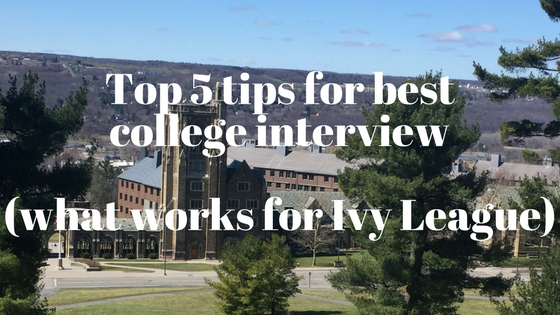Many colleges may offer interviews with an admissions representative or alumnus as part of their college application process. The college interview is an opportunity for the interviewer to get to know the student beyond their grades and test scores.
There are 2 types of interviews – evaluative and informational. The evaluative interview is used to learn more about the student and whether they’re a good fit for the college. The informational interview is more casual and not used to evaluate whether the student is admitted.
Interviews are time-consuming for the colleges, so if the admissions representative or alumnus is making the effort to meet with a student, that interview will likely be used to confirm an admissions decision, i.e. evaluative. For the Ivy League and many selective colleges, an interview may be listed as “recommended”, which is a polite way to say that it will be used. Cornell makes clear that interviews are required in the application process for its Architecture program.
Students should take the interview seriously, even if it’s considered “optional”, “recommended,” or “not required.” It’s a chance for students to show their unique qualities beyond the written application. These college interview tips will help students be prepared.
1. Prepare questions in advance to ask during the interview – not having any questions may show a lack of curiosity and/or interest in the college, i.e. red flag. Have at least 3-5 questions ready to ask. These questions can be related to academics, majors, social life, or financial aid. Just make sure the questions are thoughtful and not easily found on the website!
 2. Review and practice sample questions. Mock interviewing with a teacher or counselor is a good way to practice how to respond to different types of questions. There’s no guarantee of having the exact same questions during the actual interview, but, at the least, the student may be more relaxed after the mock session. Here are a few sample questions to review and practice:
2. Review and practice sample questions. Mock interviewing with a teacher or counselor is a good way to practice how to respond to different types of questions. There’s no guarantee of having the exact same questions during the actual interview, but, at the least, the student may be more relaxed after the mock session. Here are a few sample questions to review and practice:
- What interested you in our college?
- How have you changed during high schools?
- What is the best advice anyone has given you?
- Who is your hero and why?
- What would you do differently if you were starting high school?
3. Take activities resume to the interview. The interviewer may or may not ask for it, but having the activities resume handy will be a good reminder of past activities and awards.
4. Tour the campus prior to the interview, if possible. Taking a tour before the interview would be a good way to refresh what’s already been learned about the college and perhaps get a student perspective. Likewise, the tour may generate new questions to stimulate the conversation during the interview.
5. Dress appropriately. Slacks or khaki pants with belt, dress shirt or polo for guys is appropriate. Girls can wear knee-length dresses or skirts, a dress shirt or polo. I strongly suggest avoiding anything sagging, revealing, “sexy” or very high heels. A good rule of thumb for what to wear to your college interview would be . . . if the interviewer remembers what you wore . . . then it was probably inappropriate.
Which college(s) are you interviewing with? Is it with an alumnus or admissions representative? I look forward to hearing from you in the comments below.

